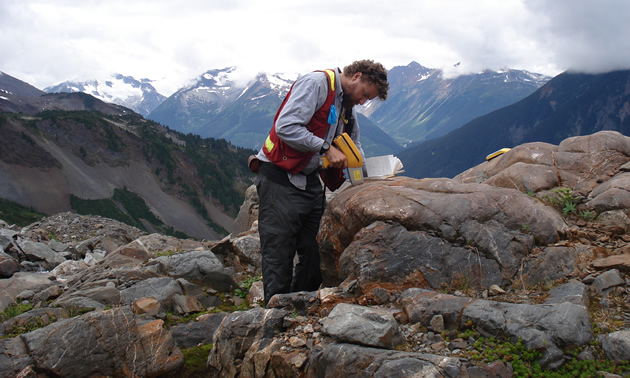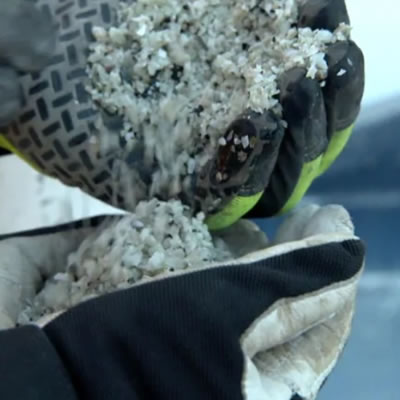Technological advances are the key to discovery
TerraLogic Exploration's senior geologist said new technology is helping discover and advance new exploration projects

Geologist Chris Gallagher uses an XRF unit on Eagle Plains Resources’ Kalum property in northern B.C. — Photo courtesy TerraLogic Exploration Inc.
Mineral exploration is a different game from what it was 20, 50 or 100 years ago. It’s probable that most of the world’s surface ore deposits have already been discovered, making many of the traditional methods of exploration less effective than they have been in the past. For this reason, new methods of acquiring surface and subsurface data—and then standardizing and interpreting that data—are increasingly important. Chris Gallagher believes that new ore body discoveries will be found in the database as much as in the field.
Gallagher is a senior geologist and chief geologic database administrator with TerraLogic Exploration Inc., a mineral exploration consulting company based in Cranbrook, British Columbia. Through TerraLogic, Gallagher has worked on properties throughout Western Canada and Mexico, where his skills in geologic mapping, structural geology, GIS and database design have been instrumental in advancing grassroots exploration projects.
From the ground up
Gallagher said his key role within the company is to ensure that field crews are collecting high-quality geologic, geochemical and geophysical data consistently and efficiently. The crews use time-honoured techniques for soil, silt and rock sampling, and augment these efforts using specialized equipment such as XRFs, scintillometers and airborne geophysical surveys.
This standardized data is then entered into TerraLogic’s customized databases, allowing lead geologists and their teams to share and analyze this data seamlessly. Having a unified exploration data model means that systematic baseline analysis can be automatically applied to all of the exploration projects that the teams are working on, freeing up valuable time for more advanced project-specific analyses.
“We’ve been collecting data digitally for over 10 years now,” said Gallagher, “and our methodology allows us to collect data in a new way or look at it in a new way that hasn’t been done before. It allows us to evaluate properties in a new way—those that have been picked over a dozen times using traditional methods. It allows people to collect better data in a timelier fashion (that) hopefully allows you to analyze that data very quickly.”
Continuing to refine
Gallagher said TerraLogic takes the approach that cutting-edge technology is critical to discovering new deposits that are not detectable using traditional methods. He has led a company initiative to utilize, develop and refine technology that he said increases their ability to look into the earth reliably.
“We’re going to need new technology and exploration methodology,” said Gallagher. “That’s the bottom line. If you could just take a soil sample or visually assess the rock and say 'yeah, there’s an ore deposit here,' we would continue to do that. But as these get discovered, we need to discover new methods.”




